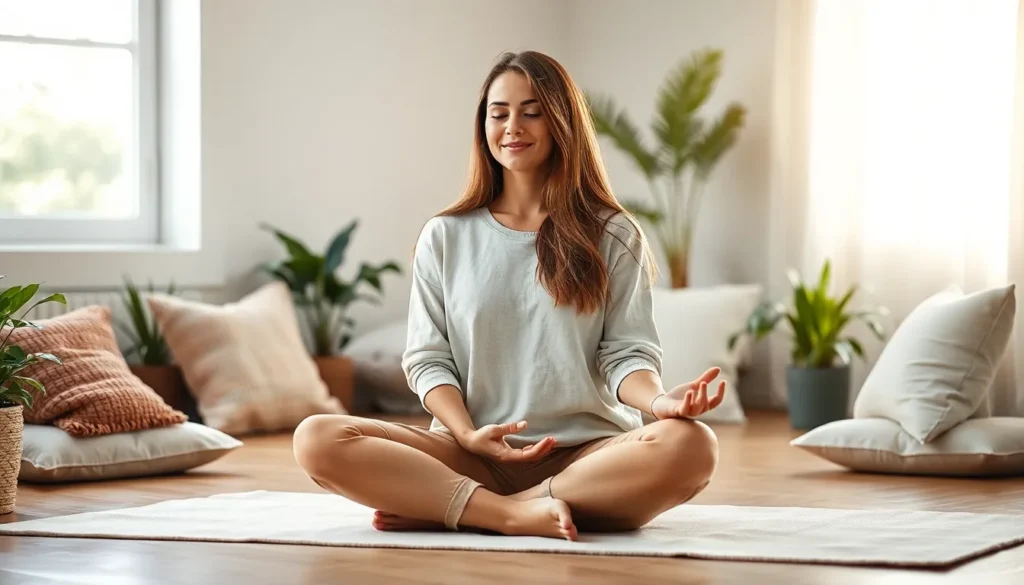Table of Contents
ToggleIn a world that often feels like a circus, juggling responsibilities can leave anyone dizzy and overwhelmed. Enter self-care meditation, the superhero of stress relief. This powerful practice isn’t just about sitting cross-legged and chanting mantras; it’s a delightful escape that helps recharge the mind and soul. Think of it as a mini-vacation for your brain—no sunscreen required!
What Is Self-Care Meditation?
Self-care meditation refers to a specific form of mindfulness practice focused on enhancing one’s mental and emotional well-being. This technique employs various meditation styles aimed at reducing stress and promoting relaxation. Practitioners engage in guided breathing exercises, visualization, or body scans to achieve a deeper sense of peace.
Meditation sessions can vary in length, typically lasting from five to thirty minutes, depending on individual preference. Each session centers on fostering self-awareness and self-acceptance, allowing individuals to connect with their inner selves. This connection serves as a foundation for resilience against daily challenges.
Self-care meditation encourages participants to cultivate a nurturing attitude toward themselves. It also offers practical tools to manage anxiety and navigate turbulent thoughts that often arise in daily life. By prioritizing inner calm, individuals create a safe mental space that enhances clarity and focus.
Research supports the positive effects of self-care meditation. Studies indicate that regular practice can lead to lower levels of cortisol, the stress hormone, thereby reducing overall anxiety. This form of meditation not only alleviates stress but also improves mood, contributing to a more balanced emotional state.
Embracing self-care meditation means choosing to empower oneself. As individuals dedicate time to these practices, they develop healthier coping mechanisms and emotional awareness. Ultimately, self-care meditation stands as a vital practice for anyone seeking to enrich their mental health and foster serenity amid life’s demands.
Benefits of Self-Care Meditation

Self-care meditation offers numerous advantages, impacting both mental and physical health significantly.
Mental Health Advantages
Mental health improves through self-care meditation. Consistent practice lowers anxiety levels, enhances mood, and develops resilience. Individuals experiencing stress find stability in their emotions, as mindfulness fosters self-acceptance. Studies show a decrease in depressive symptoms when participants engage regularly. Mental clarity also benefits from this practice, leading to improved focus and productivity in everyday tasks.
Physical Health Benefits
Physical health sees marked improvement with self-care meditation. Research indicates that regular sessions reduce cortisol levels, which helps combat stress-related illnesses. Improved sleep quality is another significant benefit, leading to enhanced energy and overall well-being. Heart health improves, as mindfulness practices contribute to healthier blood pressure levels. By integrating self-care meditation, individuals support their body’s needs and reinforce their physical vitality, promoting longevity.
Techniques for Practicing Self-Care Meditation
Self-care meditation encompasses various techniques designed to enhance mental and emotional well-being. These practices encourage individuals to reconnect with themselves through focused methods.
Guided Meditation
Guided meditation involves following verbal instructions from an instructor or an audio recording. This method provides a structured environment for practitioners, often easing the transition into a meditative state. Practitioners can explore different themes, such as relaxation or stress relief. Sessions typically last from five to thirty minutes, making it accessible for busy schedules. Numerous apps and online resources offer guided sessions catering to various preferences, ensuring an inclusive experience for users.
Mindfulness Meditation
Mindfulness meditation emphasizes being present in the moment. This technique encourages individuals to observe their thoughts and feelings without judgment. Participants learn to focus on their breath and bodily sensations, creating an awareness of the here and now. It fosters a sense of calm and clarity amidst life’s chaos. Regular practice reduces anxiety and enhances emotional regulation. Through this technique, practitioners cultivate acceptance, leading to improved self-awareness and self-compassion.
Visualization Techniques
Visualization techniques invite individuals to imagine peaceful settings or desired outcomes during meditation. This practice engages the mind and stimulates creativity while promoting relaxation. Practitioners often visualize scenes like serene beaches or tranquil forests, evoking a sense of tranquility. This method connects the mind with positive feelings, enhancing overall emotional well-being. Utilizing visualization can improve focus and motivation, making it a powerful self-care meditation tool. Regular engagement with this technique encourages a deeper connection to personal goals and aspirations.
Integrating Self-Care Meditation into Daily Life
Self-care meditation fits seamlessly into daily routines, enhancing overall well-being through simple changes.
Creating a Meditation Space
Designing a dedicated meditation space fosters a calming environment. Choose a location that feels serene and inviting, such as a quiet corner or a cozy room. Incorporate elements like cushions, soft lighting, and plants to create a relaxing atmosphere. Personalize the space with meaningful items like crystals or inspirational quotes, promoting a positive mindset. Freedom from distractions is essential; ensure the area is quiet and free of interruptions.
Setting a Routine
Establishing a consistent routine helps integrate self-care meditation into daily life. Aim for specific times each day, such as early mornings or before bedtime, to build a habit. Commit to a duration, whether it’s five to thirty minutes, gradually increasing as comfort grows. Utilize reminders, such as alarms or calendar alerts, to encourage consistency. Flexibility can enhance the experience, allowing meditation practice to adapt to various daily schedules. Prioritizing this time emphasizes its importance and effectiveness in reducing stress and enhancing well-being.
Embracing self-care meditation can transform one’s approach to mental and emotional well-being. By incorporating this practice into daily life, individuals can experience significant benefits that enhance resilience and promote a balanced state of mind. It’s not just about finding a moment of peace but also about nurturing a deeper connection with oneself.
With various techniques available, self-care meditation offers flexibility to suit personal preferences and lifestyles. Prioritizing this practice can lead to lasting improvements in overall health and happiness. As individuals commit to their self-care journey, they empower themselves to navigate life’s challenges with greater ease and clarity.







